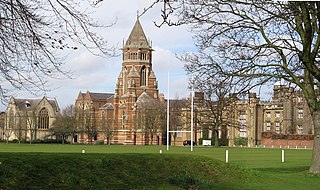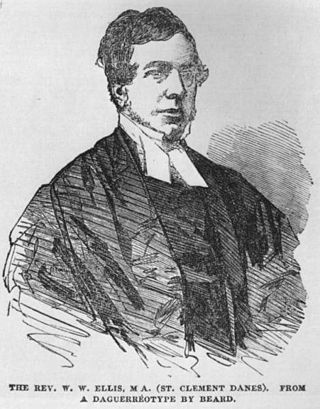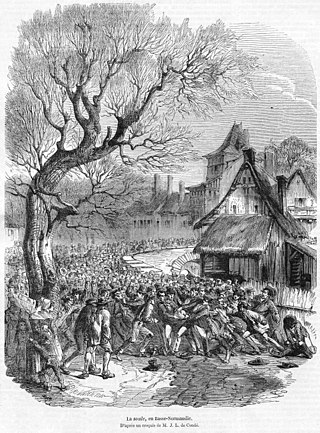
Rugby football is the collective name for the team sports of rugby union and rugby league.

Rugby School is a public school in Rugby, Warwickshire, England.
A football is a ball inflated with air that is used to play one of the various sports known as football. In these games, with some exceptions, goals or points are scored only when the ball enters one of two designated goal-scoring areas; football games involve the two teams each trying to move the ball in opposite directions along the field of play.

Rugby is a market town in eastern Warwickshire, England, close to the River Avon. At the 2021 census its population was 78,125, making it the second-largest town in Warwickshire. It is the main settlement within the larger Borough of Rugby, which had a population of 114,400 in 2021.

William Webb Ellis was an English Anglican clergyman who, by tradition, has been credited as the inventor of rugby football while a pupil at Rugby School. According to legend, Webb Ellis picked up the ball and ran with it during a school football match in 1823, thus creating the "rugby" style of play. Although the story has become firmly entrenched in the sport's folklore, it is not supported by first hand evidence, with the story emerging only after Webb Ellis's death.
Matthew Holbeche Bloxam, a native of Rugby, Warwickshire, England, was a Warwickshire antiquary and amateur archeologist, author of a popular guide to Gothic architecture. He was the original source of the legend of William Webb Ellis' invention of the game of Rugby football.
A ball is a spherical round object with various uses.

The history of rugby union follows from various football games long before the 19th century, but it was not until the middle of that century that the rules were formulated and codified. The code of football later known as rugby union can be traced to three events: the first set of written rules in 1845, the Blackheath Club's decision to leave the Football Association in 1863 and the formation of the Rugby Football Union in 1871. The code was originally known simply as "rugby football". It was not until a schism in 1895, over the payment of players, which resulted in the formation of the separate code of rugby league, that the name "rugby union" was used to differentiate the original rugby code. For most of its history, rugby was a strictly amateur football code, and the sport's administrators frequently imposed bans and restrictions on players who they viewed as professional. It was not until 1995 that rugby union was declared an "open" game, and thus professionalism was sanctioned by the code's governing body, World Rugby—then known as the International Rugby Football Board (IRFB).

Twickenham Stadium in Twickenham, south-west London, England, is a rugby union stadium owned by the Rugby Football Union (RFU), English rugby union governing body, which has its headquarters there. The England national rugby union team plays home matches at the stadium.
William Gilbert (1799–1877), established Gilbert company, the manufacturer of sports equipment, in 1823. Gilbert had a boot and shoemakers shop on 19 High Street next to Rugby School and started making balls for the school out of hand stitched, four-panel, leather casings and pig bladders. These balls were bigger and rounder than today's balls, which made them easier to kick longer distances.

The World Rugby Museum is a sports museum in the South Stand of Twickenham Stadium, London, England. Its collection comprises over 37,000 pieces of rugby memorabilia, boots, balls, jerseys, programmes, match-tickets, books and assorted paraphernalia.

A rugby ball is an elongated ellipsoidal ball used in both codes of rugby football. Its measurements and weight are specified by World Rugby and the Rugby League International Federation, the governing bodies for both codes, rugby union and rugby league respectively.

The 2009 FIFA Confederations Cup was the eighth Confederations Cup, and was held in South Africa from 14 June to 28 June 2009, as a prelude to the 2010 FIFA World Cup. The draw was held on 22 November 2008 at the Sandton Convention Centre in Johannesburg. The opening match was played at Ellis Park Stadium in Johannesburg. The tournament was won by Brazil, who retained the trophy they won in 2005 by defeating the United States 3–2 in the final.
During the early modern era pupils, former pupils and teachers at English public schools developed and wrote down the first codes of football, most notably the Eton College (1815) and Aldenham school (1825) football rules. The best-known of these is rugby football (1845). British public schools football also directly influenced the rules of association football.

Gilbert Rugby is a sports equipment manufacturing brand, specialising in rugby union and netball. The company is mostly known for its rugby union balls, having been official supplier for every World Cup since 1995.
1823 in sports describes the year's events in world sport.

Football is a family of team sports that involve, to varying degrees, kicking a ball to score a goal. Unqualified, the word football normally means the form of football that is the most popular where the word is used. Sports commonly called football include association football ; gridiron football ; Australian rules football; rugby union and rugby league; and Gaelic football. These various forms of football share to varying extents common origins and are known as "football codes".
Craigmount School was a private school originally for boys, but for most of its history for girls, in Edinburgh. It opened in 1874 and closed in 1966.
Webb Ellis Limited is a British manufacturing company based in London. The company, focused on rugby union and netball, manufactures a wide range of sports equipment, including sportswear, rugby union balls, protective gear, and accessories.
The following are events in the 1820s decade which are relevant to the development of football.











